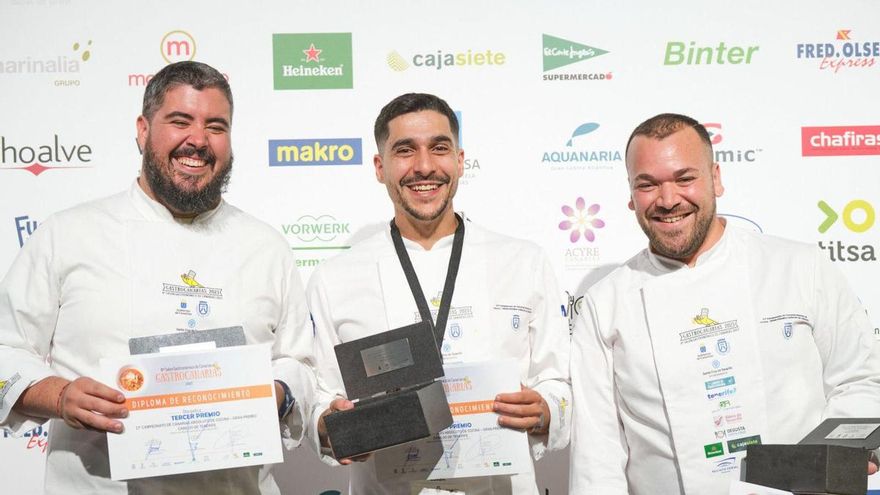
The political class paraded, as is customary, on the opening day of the Canary Islands Gastronomic Hall held yesterday at the Santa Cruz Fairgrounds, but this time -given the proximity of the municipal and regional elections- their presence was perhaps more evident never. There were all colors, a large bunch of species of varied biodiversity, dotted with the odd endemism.
Class policy paraded, as is customary, on the opening day of the Gastronomic Hall of Canary Islandsbut this time –given the proximity of the municipal elections and autonomic – their presence became perhaps more evident than ever. There were all colors, a large bunch of species of varied biodiversity, dotted with the occasional endemism, which did not hesitate to bring the ember to their sardine when it was their turn to address the auditorium, recalling the benefits of their management and praising colleagues and rank mates.
The Gastronomic Fair also breaks records: more occupied area and, consequently, greater number of exhibitors; the sum of two new championships, until reaching a total of twelve; the incorporation to the event of two new Tenerife councils, those of Icod de los Vinos and Guía de Isora… and a dedicated audience from the very first hour: GastroCanarias has won the popular vote.
Chefs Championship.
Roberto Couto Fernández has been proclaimed winner of the seventeenth edition of the Canary Islands Absolute Cooking Championship – Big prize council of Tenerife, held yesterday on the first day of GastroCanarias. Second place went to Daniel Castro Espinar (Gran Canaria) and third place, worth 500 euros, went to Iván Mario Yamuza gonzalez (Gran Canaria). The award for best assistant went to Iván Pulido Rodríguez (Gran Canaria). For the first course, with the Gallo Isleño as the mandatory ingredient, Couto prepared a recipe entitled El Gallo de los huevos de oro, a smoked breast with creamy black potato puree, golden spherification of his own broth and an intense sauce also with his own broth. For the second recipe, Couto prepared an Atlantic sea bass that he named Lubina, batata y su broth, a low-temperature tenderloin with roasted sweet potato, green mojo sauce, and citrusy and spicy false pil pil. These elaborations decided in his favor the first prize, endowed with 1,500 euros.
A native of Tegueste, Roberto Couto studied at the IES Virgen de Candelaria and has been working as a cook since he was 18 years old. He currently works as head chef at Andana Beach Club, Puerto de la Cruz. Also competing were Alexandre Ibani Campos Piñero, Raúl Lion Noriega, Frank Gómez Cortés, Julia Román Martínez and Aurelio Cucca (Tenerife); Rayco Jiménez Santiago, Daniel Castro Espinar and Richard Díaz Aguilar (Gran Canaria); Mario Yamuza González (Fuerteventura), José Manuel Fernandez Lama (Lanzarote),
The Best Pizza in the Canary Islands.
At the Fairgrounds, yesterday Italian was spoken in almost every corner and the reason was none other than the celebration of the 4th Canary Islands Pizza Championship – Grupo Commit Grand Prix. After the contest, the jury awarded the following prizes: first place, Alessandro Gemma, who will represent the Canary Islands in the World Pizza Championship, to be held in the city of Parma next year; the second place corresponded to Daniele D’Auria, while the third classified was Mattia Barrago.
Gastro Lovers breakfasts.
Santiago del Teide once again gives off a particular aroma, turning its stand into an obligatory meeting point. His Gastro Lovers breakfast is committed to healthy cooking, led by Natalia Rodríguez, a Uruguayan living on the island. The proposal opens with three tubs: cocoa with almonds from this town, another with avocado paste, plus one with a mixture of mango and orange, accompanied by a restorative juice based on carrots, dragon fruit and banana. Next –still savoring– a new delicacy: a dish that contains a waffle made with bonita potatoes on which rests a poached egg, as well as black pork bacon and flambéed banana. The sweet finish, a Greek yogurt with chia, in oat milk and beetroot, as well as almonds and pistachios. Meal time is not wasted either; local restaurateurs are responsible for serving an attractive table.
Food from La Gomera.
Some of the producers of Colombina Island show the public of the Gastronomic Hall the exceptional characteristics that gomeran flavors and agri-food products treasure, such as the iconic almogrote, artisanal jams, as well as cheeses, cookies and sweets, along with mistelas and wines . In turn, they make known the wide variety of applications of these products in traditional and avant-garde dishes.
Fuerteventura and its roast goat
Fuerteventura, the guest island in this edition of GastroCanarias, is presented at the Gastronomic Hall with a stand that under the motto The flavor of tradition bears the mark of the Majorero Cabildo. Even with the hangover from the recent celebration of the 35th edition of Feaga -without a doubt the agricultural, livestock and fishing fair par excellence-, Majorera cuisine is discovered from the affirmation of one of its most relevant hallmarks: the goat . This native breed is not only responsible for procuring the milk with which the different types of the famous Majorero Cheese are made -the first in the Canary Islands to obtain the Protected Designation of Origin (PDO) and one of the most recognized and praised products of that Island-, but also for the intrinsic value of its meat, perhaps still not sufficiently appreciated beyond the insular limits. Hence, a group of cooks and supporters of the association that brings together the defenders of this local ruminant, blessed by the Island Corporation and by the hand of María Trujillo, decided to commemorate a barbecue in the middle of the Fairground -before, the youngest had offered a showcooking in the Heineken Space-, with the goat as a claim, offering it in cutlets and skewers, and also in the form of a delicate pâté, in the French way, made with the least noble parts of the animal -liver and neck-, but of a new flavor. In addition, Fuerteventura can boast of having up to 14 quality packaged olive oil brands; also with some wines that are beginning to emerge little by little, as well as traditional products such as gofio or honey and other elaborated ones, such as jams, mojos or the always striking and unique goat liquor. | Sergio Lojendio
















